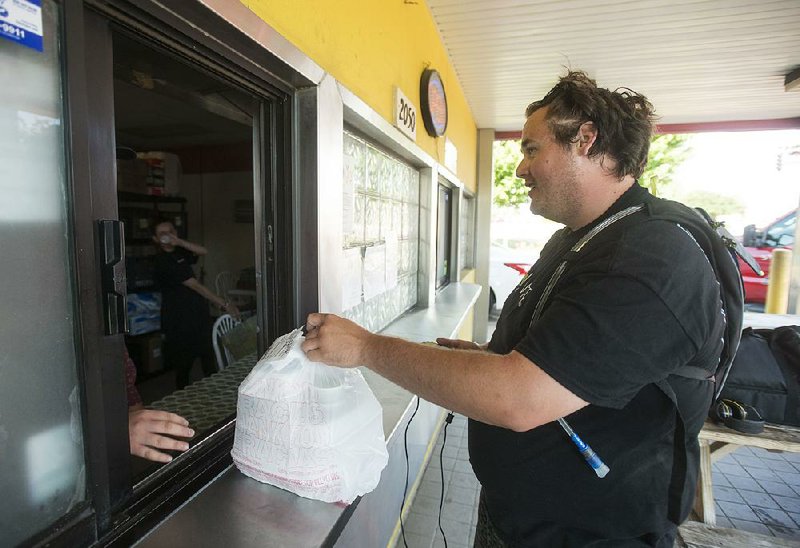Food-delivery companies such as BiteSquad, UberEats and Waitr are changing the way people eat restaurant meals nationwide, including in Arkansas.
Food delivery saw “sizable gains” in the past five years, according to NPD Group, a global information company. The Chicago-based group reported a 20 percent increase in delivery sales and 10 percent gain in delivery orders. This is largely attributed to the growing popularity of digital ordering, which represents more than half of all deliveries.
“Delivery has become a ‘need to have’ and no longer a ‘nice to have’ in the restaurant industry,” Warren Solo-check, NPD Group’s senior vice president of industry relations, said in a statement. “Restaurants need delivery in today’s environment in order to gain and maintain share. It has become a consumer expectation.”
The increase in orders through third-party delivery services is good for business but can be tricky for all parties involved.
“They’re like any other delivery service. They’re gonna have their ups and downs,” said Darell Bohannan, a Slim Chickens manager in Fayetteville.
Arkansas has a handful of mobile-app delivery options. After purchasing state-based Chef Shuttle last summer, BiteSquad has the largest share with services available in 10 cities. The Waitr delivery service is available in six cities and UberEats is now in Little Rock.
A.B. Alwan, owner of Shark’s Fish and Chicken in Little Rock, placed UberEats above the rest. When it came to estimated time of arrivals, the California-based company delivered.
Alwan said driver shortages with some services has been an issue.
“It can take a long time to come and pick up food,” he said.
Xavier Marciel, a manager at Purple Cow in Little Rock, said he’s seen almost two-hour delivery times.
Restaurant chains and investors have been betting on delivery aggregators to help buoy profits. Houston Rockets owner Tilman Fertitta agreed to pay $300 million for Waitr last month. Popeye’s Louisiana Kitchen is working with UberEats to broaden its reach, after posting a same-store sales gain last quarter from online deliveries at a couple hundred locations.
NPD Group’s Solocheck predicts delivery services will grow over the next five years as technology advances, attributing “nontraditional delivery outlets” as the catalyst.
Some restaurant chains like Panera Bread have invested in their own delivery fleet to compete. To build on its delivery model, Domino’s rolled out technology this spring that helps drivers find customers not waiting at a traditional street address, such as park benches, beaches, etc.
“It’s a greater move toward convenience over everything else,” said Mervin Jebaraj, director of the Center for Business and Economic Research at the University of Arkansas, Fayetteville.
Mobile delivery apps make it easier for customers to make delivery orders. Food is delivered with the push of a touch-screen button, reducing customer “friction” associated with delivery orders, Jebaraj said.
It’s also cost-effective. Restaurants can rely on third-party delivery services instead of doing it themselves, Jebaraj said. As a precaution, he said “restaurants need to be mindful of what happens when food is outside of their control.”
Delivery services can bolster slow nights at restaurants, Jebaraj said. “On the flipside, it might also make it busier on busy nights,” he said. “Which is something restaurants need to be more aware of.”
Several Arkansas restaurant managers said mobile delivery apps have been both a pain and gain for them.
Chris McWirt, a Chuy’s manager in Rogers, said the Tex-Mex chain’s partnership with BiteSquad has been “big for us.”
McWirt admitted there’s been some “growing pains” at the beginning that have since been “ironed out.”
Restaurants have changed their policies in wake of the delivery service apps. Managers said they prioritize restaurant diners and takeout orders, over orders placed using an independent mobile app. There are times when drivers are backed up with deliveries and it takes longer than expected to arrive at the restaurant.
Kitchen staff at fast-casual Slim Chickens begin preparing an order when the driver arrives at the restaurant, Bohannan said.
High-volume restaurants balance the two. Another Chuy’s manager, Weston Horne, said there are times at the Rogers store when it can be “hectic” and “have six [mobile delivery orders] flashing and we’re already busy.”
Employees working the takeout counter often get a raw deal. Customers pay for food and the delivery fee through the mobile app. UberEats and Waitr charge a flat fee of $5. BiteSquad’s fee fluctuates, based on delivery distances. But there’s no requirement to tip the drivers or restaurant staff.
“That part gets annoying,” Horne said. Restaurant staff is not making money so “we had to pay to-go [workers] more to compensate.” He guessed about a quarter of the store’s delivery orders are handled by BiteSquad.
Depending on the weather, the Purple Cow’s Marciel estimated less than half of Purple Cow’s takeout orders are third-party deliveries. At Slim’s, Bohannan said it was somewhere between 10 to 15 percent.
Horne attributed the rise in delivery services to a social phenomenon conditioned by recent technology advancements.
“We’re getting to that day and age where no one wants to talk to anyone,” he said.
Mobile delivery apps make it easier for customers to make delivery orders.

